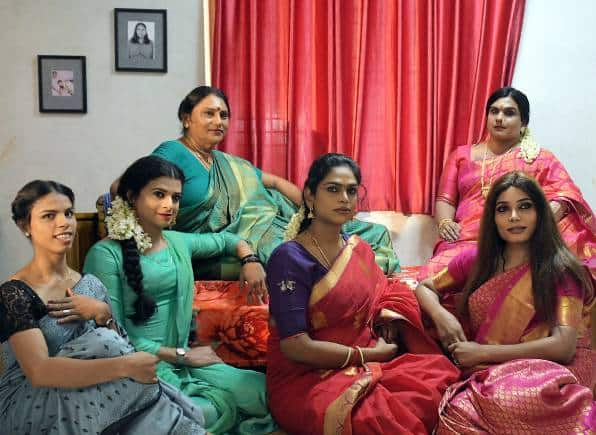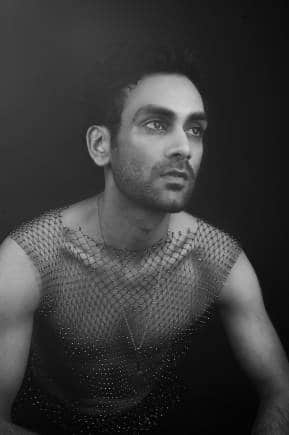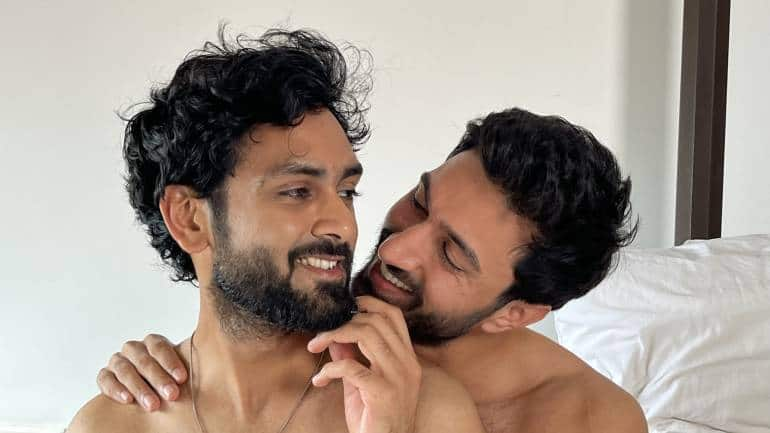



Over the years, Indian cinema has broken new ground in producing movies centralising queer people’s struggle for societal acceptance, the right to marriage, and equal opportunities at work. While more people are coming out and embracing their identity publicly, queer people still fail to place someone who they believe is one of their own playing a character that portrays their lived experiences. It’s true, however, that anyone who can act and deserves must play the part. But it’s the systemic blocking of queer people to own their narratives on the celluloid that’s problematic.
Writer and video jockey, Negha Shahin, who created history by becoming the first transwoman to bag the debut actor award at the 52nd Kerala State Film Awards, for her performance in the Malayalam movie Antharam in 2022, never knew if she’ll become an actor after having been forced out of her natal home and discontinuing her graduation degree because of discrimination by peers and teachers alike.
 Negha is the first transwoman to bag the debut actor award at the 52nd Kerala State Film Awards, for her performance in the Malayalam movie 'Antharam' in 2022,
Negha is the first transwoman to bag the debut actor award at the 52nd Kerala State Film Awards, for her performance in the Malayalam movie 'Antharam' in 2022,“Indian cinema particularly has several stereotypes. And then, there’s nepotism, so for a person like me, who comes from a village where there’s no transportation facility, has darker skin and with a lot of insecurities and complexes about herself, it was a difficult journey. When my family kicked me out, I started looking for means of survival. It’s a miracle that a director approached me for a role in a short film (Manam). But I wasn’t confident. I used to frequently check with him if I’m good enough, to ensure that he hasn’t mistakenly cast me. He told me that I was the right casting choice; that I had a good dialogue delivery. But I was terrified he didn’t allow me to put on any makeup, so I began worrying about my screen appearance,” Negha notes.
She continues, “But people supported me genuinely. I got praise for that role. The journey though remains full of struggle. I don’t get lead opportunities. It’s surprising that people fail to realise that it’s their social responsibility to give roles to a trans actor.”
Negha, who found it difficult to navigate the cine world as a brown-skin actor, submits that “for any woman actually, it’s the same. Plus-size people are not made to feel included. But it’s all the more difficult if you’re a transwoman because then you’ve to be very fair and beautiful to bag a role. I haven’t overcome my insecurities. But I believe in my talent now, I take care of myself, and try to deliver my best.”
The other differences she sees are between the treatment given to cis and trans actors on a set. “I’ve faced such discrimination. Sometimes if a makeup or hairdresser happens to be a man, they enquire how come I’m here being a trans person. Now I give it back to them. I ask why’s that so and whether they feel threatened by my existence. I alert the director if such a thing happens,” she says.
 Negha (front, centre) in a still from her film 'Antharam'.
Negha (front, centre) in a still from her film 'Antharam'.But despite her talent and the accolades she has received, when she found herself jobless for months on end, she joined a private firm to support herself financially. The only way anything can change, she feels, is by “occupying the industry”. After acting in several projects, Negha, who’s also a theatre director, is already foraying into production and direction because she feels “responsible to lift and empower other trans actors”. She’s searching for allies who can fund her projects. The other reason she wants to provide opportunities to others is because of the discrimination she has faced at the hands of production houses. “Some have informed me that they’ve limited budget for a trans artist,” she shares.
With limited employment opportunities, social security would’ve helped a lot but besides the Kerala state government’s insurance policy that helps trans people claim five lac rupees for surgery and transition, there’s limited or no help for trans people to avail. When probed to file for a claim of family property, she shared how horrifying and humiliating is to get a social/legal document made. “To get a social document made, a trans person’s identity has to be approved by a cishet doctor, who checks our bodies, then counsellors ask us questions and after their satisfaction, they give us a document, which we use to get Aadhaar or passport made. In particular, I faced discrimination in getting my passport made. They, against my will, put ‘T’ in my passport. Because of that, in Sri Lanka, I was humiliated when these people asked me what’s this ‘T’. I had to explain to them that and about the surgery as well. They made fun of me, those officers, then finally asked me if I want ‘M’ or ‘F’ on my visa, as they only recognise these two gender identities, so there’s discrimination every step of the way,” she submits.
 Actor Vidur Sethi was recently seen in Onir's Pine Cone.
Actor Vidur Sethi was recently seen in Onir's Pine Cone.Lead actor in Onir’s next feature film Pine Cone, Vidur Sethi’s (He/They) journey, on the other hand, began when he faced the camera for Sharbendu De’s Elegy for Ecology shoot. “Post that, I felt that I could extend my journey from performance art and theatre into screen acting,” they submit.
Sethi notes that they’re already seeing “the hierarchies being relatively vertical in the film industry,” so “it’ll take time and effort to make a space for myself and also act in ways that can seem like errors initially, but I shall continue to look at my craft rather than adhering to the norms that entail the industry. Simultaneously, I’d say that there’s [an] acceptance that has come as a result of being open about myself, which in itself is a remarkable feat for our community, and the movies. More so because they influence us in a huge way and we need more queer voices to enter in and puncture the ways people perceive bodies, films, content, [and] engagement.”
 A still from 'Pine Cone'.
A still from 'Pine Cone'.According to Sethi, queer person faces and experiences similar setbacks in movies the way they do in society and their everyday lives. For them, however, “the point is that one finds people who are willing to negotiate and give you the space to be and perform, so one has to keep their head up and understand that life is a dream and life both. Sometimes, you can control the content by learning, at other times, forces will work towards you where you’ll feel challenged, but you must never give up. If structures don’t exist, create them!”
While performing as a lead for a feature is a huge responsibility and “a new territory” for them, “recovering from COVID” was another challenge they faced while beginning their shoot. But they consistently reminded themselves “to be honest in a given moment — with all my anxieties, as well as my integrity in place and then sailing through difficult challenges.”
They also second that “there is a need for more voices, bodies, [and] stories. Literally, in terms of content, [and] in terms of physicality. We face the challenge of compromise and constant negotiation, I believe, but that’s because some of us are privileged in certain ways and can take up the tasks to dissect power and simultaneously know that it’s not going to be easy, but I’m certain that if our intentions are right, we can continue to move further and deeper. I think the change I would like to see is the portrayal of more people from even more marginalised communities — more folks from the transgender community, from the Dalit community who are queer.”
But what they highlight, in particular, is the need for dedicated “space[s] to run the show for us to portray diverse contexts for emotions and bodies. And then of course, structural things like checking in with everyone [about] how one is feeling during the process, having mechanisms for coordinating intimacies and dialogues, taking time to process to make work that can truly shift people’s perspectives and not letting our ambitions die because of monetary restraints or institutional controls. The more of us are there, the better,” the actor submits.
Furthermore, they share how beneficial it’s to work with a queer or queer-affirmative director. “[Onir’s] choice to tell stories revolve around the lives of queer people, [and] focus on the queer gaze, not the norms in terms of aesthetic or cultural production. He’s not interested in playing for the audiences or people who only have one idea about making films and this is my understanding of his directions. Instead, he’s open to getting more voices on board, and also telling stories that he wants to, the way he wants to, without glamorising. It can be comforting at times, but also discomforting for audiences to view, but the idea is to not stop and keep working, negotiate where it’s necessary, and with every film, bring in something different.”
Discover the latest Business News, Sensex, and Nifty updates. Obtain Personal Finance insights, tax queries, and expert opinions on Moneycontrol or download the Moneycontrol App to stay updated!
Find the best of Al News in one place, specially curated for you every weekend.
Stay on top of the latest tech trends and biggest startup news.